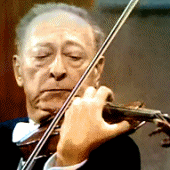Peter Rosen Productions, Inc. New York, had produced the first ever full length documentary on Jascha Heifetz, entitled "Jascha Heifetz: God's Fiddler".
Following years of research and fact-gathering, extensive filming in the USA, Europe and Russia, gathering a vast number of interviews with people, colleagues, former students and assistants, the film covers Heifetz's life and career from his birth and earliest childhood in Russia through his ensuing career in the United States. The production is assisted by the Colburn School of Performing Arts in Los Angeles, today's home of the Heifetz Music Studio. The Studio had been dismantled from the violinist's Beverly Hills residence, stored and eventually faithfully rebuilt on the Colburn School's premises (all work supervised by architect Harold Zellman), where it is presently used for violin lessons and master classes. The documentary includes extensive footage in the studio which, for the duration of the filming, has been transformed and adorned with Heifetz's authentic memorabilia.
It has been my privilege to follow the nascence and development of this unique documentary and to witness the producer Peter Rosen at work. It has also been my pleasure to do my best to assist in the making this film.
These pages invoke my personal impressions on the making of the Heifetz documentary during a period of over a year, but it is nevertheless only a sample of the work that had gone into making the movie.
There have been many highlights for me, and not all of them could be brought up or shown here. Don't expect much, technically: I am not a professional photographer and the entire video was captured with a couple of tiny pocket cameras which are notoriously difficult to hold steady in video mode. The rudimentary editing will convince anyone of the amateurish effort.
Vilnius is a delightful, pastoral town and the old quarter is simply bewitching. Loaded with history and historical sites, Jewish and otherwise, I could easily envisage it to be a fabulous location for a quiet vacation. Young people sit by the beautiful little Vilnele river for picnics or walk along its green banks. Inevitably, some western habits have caught on and there's hardly a building untouched by graffiti. The city is brimming with good restaurants, cafes and pubs - I know it sounds like a travel promo, but it's true.
As in all film-making, there were many lighter moments. We joked and enjoyed gauging the distance between the Grand Europa Hotel entrance and that of the Philharmonic Hall in St. Petersburg. It's probably less than thirty yards. Yet someone insisted Heifetz be driven in 1934 by a chauffeured limo from one to the other. I wondered whose decision it was to insist on such a redundant procedure. Were the officials insisting on etiquette? Was it Heifetz's choice to preserve and project his status? Locals tell me it took half an hour for the limo to cross the street as Heifetz was swamped by a sea of admirers crowding the street.
The price bartering at the "Heifetz door" was also amusing. The present occupiers of the former Heifetz last home in St. Petersburg simply refused to let us in unless we pay (in dollars). The building and the entire neighborhood had long fallen from grace. It was once a luxury middleclass home and even if it was the furthest from the Conservatory - all previous ones were to varying degrees within walking distance - the Heifetzes decided to rent it. It was both a statement of social and financial status, both becoming an important image to project to match Jascha's increasing artistic fame in Russia and in Europe.
We spent many pleasant moments in Russia, as we did in Los Angeles. I have attended several interviews which producer Peter Rosen had conducted, but possibly the most memorable ones were with Ayke Agus. Visits to Heifetz's former homes in Beverly Hills and at Malibu Beach enabled me to better understand the man. When the atmosphere in his former studio, now faithfully relocated at the Colburn School of Performing Arts, was minutely recreated to its former glory for the shooting session, it truly became eerily magical. It was as if time had frozen for a while and the spirit of Heifetz was once again hovering over the place.
For all that I guess you'll have to watch the real documentary, "Jascha Heifetz: God's Fiddler". For now, click on the video below for full screen.






